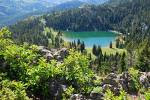 A STORY is told of an over-credulous washerman who was childless। This preyed upon his mind very much and was a permanent cause of unhappiness। One day, in the course of his work, he went to the house of the town kazi (or magistrate). He heard the kazi reproaching one of his pupils in this wise: "Not long ago you were a jackass; I made a man of you," etc. The washer-man did not wait to hear the rest. He hastened home with all speed and told his wife that he had made a discovery which they were to lose no time in utilizing. "The kazi, my dear," said the washerman, "can make a man of a donkey. Why should we fret any longer for a child? Let us take our donkey to him and beg of him to transform him." The washerman and his wife, with their donkey, were shortly after this conversation on their way to the kazi.
A STORY is told of an over-credulous washerman who was childless। This preyed upon his mind very much and was a permanent cause of unhappiness। One day, in the course of his work, he went to the house of the town kazi (or magistrate). He heard the kazi reproaching one of his pupils in this wise: "Not long ago you were a jackass; I made a man of you," etc. The washer-man did not wait to hear the rest. He hastened home with all speed and told his wife that he had made a discovery which they were to lose no time in utilizing. "The kazi, my dear," said the washerman, "can make a man of a donkey. Why should we fret any longer for a child? Let us take our donkey to him and beg of him to transform him." The washerman and his wife, with their donkey, were shortly after this conversation on their way to the kazi. Their mission being explained with many supplications, the kazi, quick-sighted, and with an eye to business, accepted the charge, and promised to effect the metamorphosis in a year. The washerman on his part promised to give his services free for that period. A year passed in waiting and in happy hopes. On the appointed day the washerman and his companion presented themselves before the kazi. The kazi took them aside and pointed out a strong young man among his pupils. "There," he whispered to the washerman, "is your donkey. You see the change: now persuade him and take him home." The washerman and his wife flew to their newly created son, and with many endearing terms prepared to embrace him and made other affectionate advances. Amazed at this unaccountable conduct of these low people, the lad resisted at first, but as they persisted, he grew furious. After receiving many a cuff from the lad, a happy idea struck the washerman's wife: turning to her husband she said, "Go you and fetch his peg, rope, and grain-bag; perhaps they may remind him of what he was once." The washerman in hot haste went home and fetched them. But it seemed to make matters worse. The washerman held up each of these articles to the young man's view, and said, in the most persuasive tone he could command, "Come home, my son. Do you forget the day you were my donkey? This was the peg to which I would tether you, this your tether rope, and this your food-bag; come to your home!" By this time a jeering crowd had gathered round the young man, and this so infuriated him that he turned to and gave the washerman the soundest thrashing he had ever received in his life. The poor dupe of a washerman---the story says---went home thoroughly convinced that what fate had ordained it was useless to fight against, looking upon his punishment as a just return for his presumption.






























